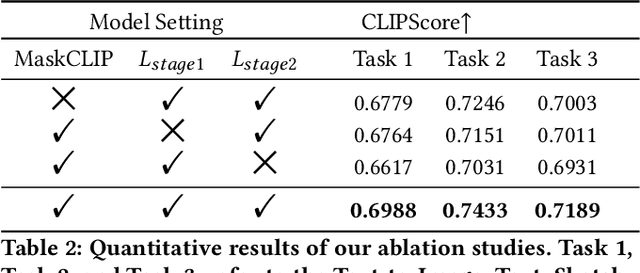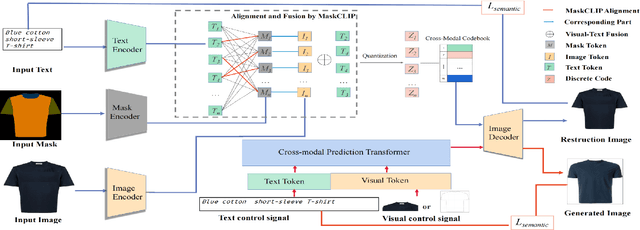Jianqing Peng
ARMANI: Part-level Garment-Text Alignment for Unified Cross-Modal Fashion Design
Aug 11, 2022



Abstract:Cross-modal fashion image synthesis has emerged as one of the most promising directions in the generation domain due to the vast untapped potential of incorporating multiple modalities and the wide range of fashion image applications. To facilitate accurate generation, cross-modal synthesis methods typically rely on Contrastive Language-Image Pre-training (CLIP) to align textual and garment information. In this work, we argue that simply aligning texture and garment information is not sufficient to capture the semantics of the visual information and therefore propose MaskCLIP. MaskCLIP decomposes the garments into semantic parts, ensuring fine-grained and semantically accurate alignment between the visual and text information. Building on MaskCLIP, we propose ARMANI, a unified cross-modal fashion designer with part-level garment-text alignment. ARMANI discretizes an image into uniform tokens based on a learned cross-modal codebook in its first stage and uses a Transformer to model the distribution of image tokens for a real image given the tokens of the control signals in its second stage. Contrary to prior approaches that also rely on two-stage paradigms, ARMANI introduces textual tokens into the codebook, making it possible for the model to utilize fine-grain semantic information to generate more realistic images. Further, by introducing a cross-modal Transformer, ARMANI is versatile and can accomplish image synthesis from various control signals, such as pure text, sketch images, and partial images. Extensive experiments conducted on our newly collected cross-modal fashion dataset demonstrate that ARMANI generates photo-realistic images in diverse synthesis tasks and outperforms existing state-of-the-art cross-modal image synthesis approaches.Our code is available at https://github.com/Harvey594/ARMANI.
 Add to Chrome
Add to Chrome Add to Firefox
Add to Firefox Add to Edge
Add to Edge